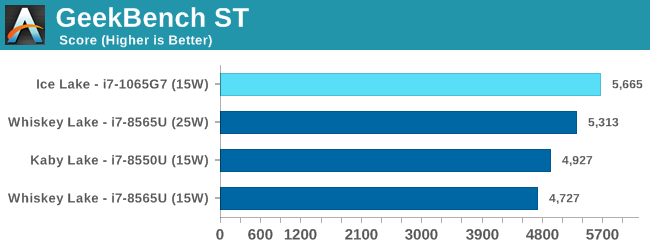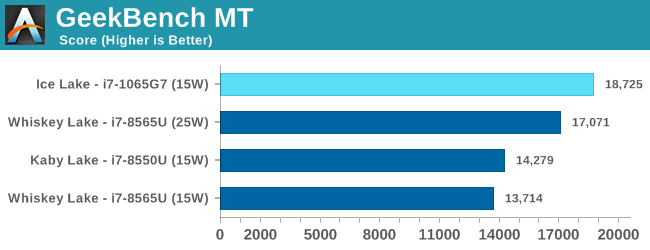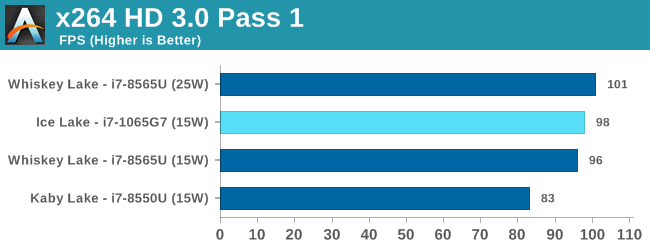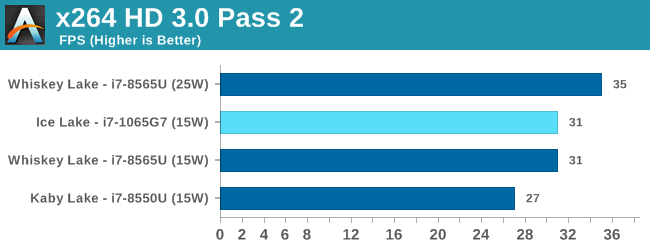The Ice Lake Benchmark Preview: Inside Intel's 10nm
by Dr. Ian Cutress on August 1, 2019 9:00 AM EST- Posted in
- CPUs
- Intel
- GPUs
- 10nm
- Core
- Ice Lake
- Cannon Lake
- Sunny Cove
- 10th Gen Core
Synthetic and Legacy Results (15W)
The realm of synthetic testing is a tricky one, given that there are plenty of benchmarks in the wild that provide a number, but aren’t actually based on real workloads, or are very limited in what they actually test. The issue here is that this software tries to emulate real-world, but it isn’t immersed in the harnesses or matrix of what a user might actually experience. For that reason, we only tend to use these benchmarks based on reader requests.
Legacy benchmarks are included for similar reasons, but can help to get a historical perspective.














261 Comments
View All Comments
CharonPDX - Saturday, August 3, 2019 - link
Wow. 0.7 GHz? AKA 733 MHz? Like the Celeron I had back in 2000? (That overclocked like a *BOSS*, just crank the FSB up from 66 MHz to 100 MHz, and get 1.1 GHz.)AV_Stables - Sunday, August 4, 2019 - link
The best OC CPU Intel ever released was the Celeron 300A (had that at 598mhz) :) almost 100% OC, moved on to Pentium 3 Coppermine & Tulatin and an ES (clocked at 733) using the 920C (rambus) chipset (horror absolute) . But coming back to earth and reality this preview is just A PR exercise in customer retention. Sure the iGPU and cores are better, but come on people are you this easily won over. The Y series is more power hungry. Id rather you stick to actual released products, as many will see this as doing Intels' PR work for them as I do.voicequal - Sunday, August 4, 2019 - link
Given that the CPU is already starting to ship to OEMs, better to have hard facts and analysis from a trusted source than weeks more of rumor and speculation while we wait for an arbitrary public release date.AV_Stables - Monday, August 5, 2019 - link
Show me one in the wild and ill say fair do.guachi - Saturday, August 3, 2019 - link
Appreciate the preview. YouTube channel Hardware Unboxed highlighted your preview and made sure to tell viewers to come here and give you guys the views.As I'm a regular reader, I'm happy to do so.
albert89 - Saturday, August 3, 2019 - link
Is it really, really, really happening this time around ?HarryVoyager - Sunday, August 4, 2019 - link
It's probably already been asked an answered, and I've missed it in the thread or review, but how do we think these are likely to stack up against the current AMD CPUs for single thread performance? I noticed that they appear to have increased the per clock performance, but appear to have had to drop the clock rate to get that.The thing that's eating my PC's lunch is primarily VR flight simulators (Tomcat Tomcat Tomcat!), and I'm expecting the main ones are going to remain single thread performance dependent for the next 5 years or so.
Basically, if it stays in the 5%-10% range, and I'm still able to put together a machine that can do 45+ fps with a Ryzen 3000, then it make more sense to take that hit, but if we're looking at a 15-20% effective difference, then the Intel option becomes more meaningful.
I just wish the Il-2 or DCS teams would put together a good benchmarking tool...
Haawser - Sunday, August 4, 2019 - link
These are low power mobile chips, not desktop CPUs.voicequal - Sunday, August 4, 2019 - link
This Ice Lake part is targeted at mobile. If you need guaranteed single thread performance, you'd be better off with a desktop part that clocks higher and can operate at max frequency for an indefinite time without running into thermal or power budget limits.https://www.anandtech.com/show/14664/testing-intel...
This page show direct comparison with Ryzen 3900X, but it's only synthetics and doesn't normalize for frequency differences between the CPUs. That will surely come later in the full review.
Pizdatron - Monday, August 5, 2019 - link
Where are the 95W etc... variance , no info on that